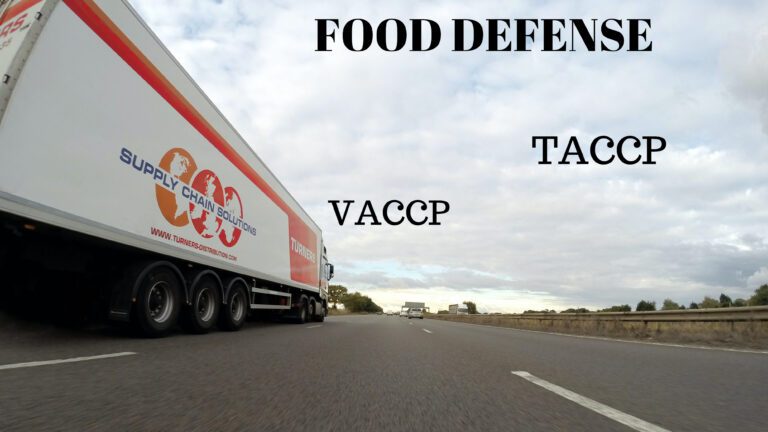Threat Assessment and Critical Control Point (TACCP) and Vulnerability Assessment and Critical Control Point (VACCP) have been relatively introduced in Food safety in recent years to prevent Food Fraud. TACCP & VACCP are based on HACCP(Hazard Analysis Critical Control Point). Both define threats and vulnerabilities forming a strong Food Defense plan for Food Safety respectively.
''Food Fraud happens in food supply chain when someone deliberately
Dilute a product concentration
Mislabels a product
Tamper the packaging/product
Substitutes the original with a substandard product.''
Difference between TACCP, and VACCP from HACCP?
As we know HACCP is an effective food safety tool against unintended food safety hazards; whereas if we notice there is no mechanism in the food industry to prevent intended hazards (deliberate) in the food industry.
TACCP signifies Threats in food processing chains for instance food tamper, and intentional adulteration.
VACCP signifies Vulnerabilities in food processing chains for instance preventing potential adulteration (intended) or contamination of food.
TACCP signifies Threats in food processing chains for instance food tampering, intentional adulteration.
VACCP signifies Vulnerabilities in food supply chains for instance preventing economically determined adulteration or contamination of food.
History of TACCP
When cases of food fraud arise across the globe immediate action needs to be taken. So an effective tool was the only answer. A novel Food safety tool was the only solution.

Enroll Free
PAS 96:2014 describes TACCP guidelines; which were originally developed by Food Standards Agency, United Kingdom in association with major retailers in the UK. These tools are associated with BRC certified Industries but ISO 22000 industries are also gaining momentum with the novel food safety tools.
Like HACCP, this requires also a control plan and correction and review procedures. It should be audited yearly and measures to be corrected if any.
Scope of TACCP
The stated aim of TACCP is to identify and manage the threats associated with food products that have a direct impact on customers and businesses. The assessment for TACCP includes:
- Food Security Factors
- Employee and Visitor entry to food premises.
- Receiving Material
- Operations
- Storage of Finished Goods
Procedure -TACCP nad VACCP


Examples of Threats and Vulnerabilities
- Economically Motivated Adulteration(EMA)
- Malicious Contamination
- Extortion
- Espionage
- Counterfeiting
- Cybercrime
Each threat above has been defined clearly in the PAS guidelines. Understanding the attackers is important in TACCP to prevent these threats.
Vulnerabilities include substitution and malicious contamination. Pointing to a thousand examples of intentional adulteration.
For instance, substituting red meat with horse meat in the final supply chain. Mixing of edible food oils with underquality food oils in the final distribution. Also Tampering with the original packaging is a leading concern from small to big retailers.
Food Defense Plan Template
The food defence plan template is a version 2.0 online builder which helps in the development of a Food defence plan. This template has tools that mitigate food fraud in your food chain.
This is the latest version developed by the Food and Drug Administration (FDA), USA. Please find the link for the tool.
Download: Food Defense Plan Builder
Who should attend training?
Multinational food companies are looking forward to reducing Food fraud in their vast food supply chains by incorporating TACCP and VACCP along the HACCP. Therefore training in the same for managers, food safety professionals, supervisors, and the person in charge is significant.
This training will help to develop a food defence plan according to the food supply chain. It helps to raise awareness, mitigate incidents, and determine threats in the food safety System.
Institutes conducting the training are low in number. Because this topic is gaining importance in due time. As per FoodTechSafety Middle East to Europe has major institutes promoting TACCP and VACCP.
Let’s list the more levels in TACCP training:
- Level 1 TACCP and VACCP Training Courses
This is an introductory level. So designed for all employees to understand their responsibilities in a food safety system.
- Level 2 TACCP and VACCP Training Courses
This course is designed for higher-level supervisors and production managers who have direct charge of food processing.
Read some of the best pieces of information about Food Fraud across the globe.
